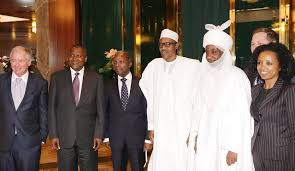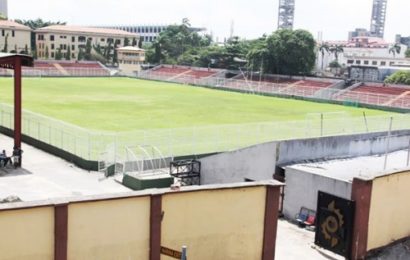 Nigeria’s leading industrialist, Aliko Dangote, has asked President Muhammadu Buhari to provide incentives to diversify the economy.
Nigeria’s leading industrialist, Aliko Dangote, has asked President Muhammadu Buhari to provide incentives to diversify the economy.
He was speaking on Wednesday at the 44th annual general meeting (AGM) of the Manufacturers Association of Nigeria (MAN), with the theme “Diversifying the Nigerian Economy: the Role of Government in Manufacturing”.
Buhari, in his own remarks, promised to remove the bottlenecks and create an investor-friendly environment in Nigeria.
In his remarks, Dangote complained about policy inconsistency, saying it destabilises industrial production plans and erodes investor confidence.
He said: “To demonstrate seriousness and sincerity in its declared drive to revive the agricultural sector, government should come out with a comprehensive package of incentives and reliefs that addresses the issues of high entry cost, absence of low interest funding, long gestation periods, access to land, availability and cost of imported inputs and absence of guaranteed commodity prices.
“For example, in India and Sudan, zero taxation is applied to their agricultural sectors to incentivize investments. With a population of over 180 million people; projected to grow to 210 million by 2020, Nigeria must pay serious attention to the issue of food security.”
Dangote said government at both national and state levels have a huge role to play in facilitating long-tern investments.
Policy Articulation
”The articulation of clear sector specific policies along with incentive packages that are commensurate with the risk inherent in each sector. Closely allied to this is the issue of consistent implementation of industrial policies,” he said.
“Policy inconsistency destabilises industrial production plans and erodes investor confidence. For instance, the suspension of the Negotiable Duty Credit Certificate (NDCC) to exporters and non-payment of existing claims has discouraged non-oil exports and frustrated contracts entered into with overseas buyers.
“More support for small and medium scale manufacturers, since many Nigerian manufacturers are relatively small with limited capital to support their investments. Government has to develop industrial clusters with requisite infrastructure for this category of businesses. They should also have access to soft loans and research & development support.
“Boosting non-oil exports to bring in much needed foreign exchange, by ratifying and implementing the road-map recently developed the Nigerian Export Promotion Council.
“Harmonizing the role of various Government regulatory agencies so as to eliminate conflict of roles amongst them. For instance, the roles of NAFDAC and SON should be properly aligned.
Energy supply
“Developing the infrastructure base of the economy by actively involving the private sector through Public-Private Partnerships (PPP), where viable. Particular attention should be given to transport infrastructure.
“Improving energy supply since no country can industrialize without sufficient and reliable energy to power her factories.
“Ensuring adequate patronage by Government and her agencies of “Made-in-Nigeria products” so as to galvanize investment in the manufacturing sector.
“Clarification by the CBN on how it intends to monitor and supervise banks to ensure that their recent directive on the allocation of 60 per cent of their transacted forex to manufacturers is complied with.
“The development of appropriate curricula for technical education and skills acquisition
“Reduce or eliminate the incidences of smuggling, adulteration and counterfeiting activities in the country. Stronger penalties should be meted out to those found culpable of these offences.
“Domicile the price of natural gas in Naira, in line with the agreement signed with manufacturers so as to avoid unnecessary conflicts. Also the benchmarking of the price of gas to the international oil price should be discontinued.
“The Gas Master Plan should be implemented to ensure adequate allocation of gas for the domestic market.
“Encourage the establishment of more Development Banks to cater for the credit needs of the industrial sector and reduce interest rate to single digit levels”.
Removing bottlenecks
Buhari assured manufacturers that his administration will remove bottlenecks and create a more business friendly environment to ensure the citizens embrace made in Nigeria goods.
He said his administration recognises the sector as a major driver of Nigeria’s economic growth because of her immense natural resources and the entrepreneurial spirit of Nigerians.
The president said his administration is focused on “implementing necessary policies and strategies aimed at unleashing the full potentials of manufacturing in Nigeria. We will rely heavily on your ideas and inputs at all stages of formulation and implementation of new industrial policies. For our part, we will remove bottlenecks and create a more business friendly environment”.
“As you know, the dramatic fall in crude oil and other commodity prices has had a serious negative impact on world economies, especially countries like Nigeria which depended on one commodity for its export earnings,” he said.
“This administration is convinced that the key to our quest for economic diversification and therefore survival lies in Agriculture and the Manufacturing sector. A strong manufacturing sector will create more jobs and wealth for our people. It will usher in sustainable economic prosperity because we will produce what we consume as a nation and generate foreign exchange by exporting any surplus.”
He said that the administration’s strategic plan to boost manufacturing activities in the country was supported by the Nigeria Industrial Revolution Plan (NIRP) and the National Enterprises Development Programme (NEDEP).
These programmes, he said, present a clear road map towards an industrialised Nigerian economy.
These policies were made by the Goodluck Jonatha administration.
“We are working on improving the patronage of locally made goods, bridging the gap between skills required by industry and those provided by our educational institutions and access to finance for our Small and Medium-Scale Enterprises (SMEs). We recognise that MAN and the other Organised Private Sector (OPS) groups are our key stakeholders in this journey and we will continue our engagement with you,” he said.








